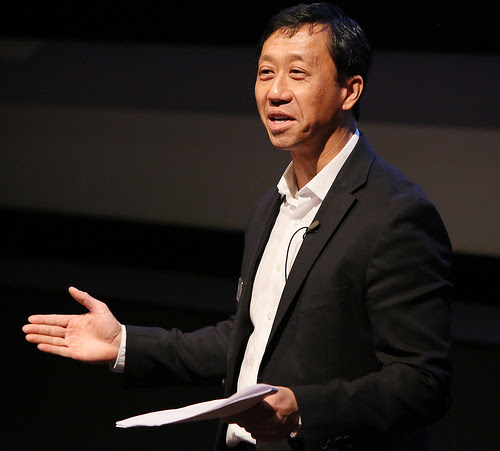When a startup doesn’t grow up it becomes just another footnote.
Part of growing up is having something sell, being able to sell it, and being fortunate enough to earn the support of early customers. Achieving distribution, and getting access to customers is often what many startups fail at.
A recent conversation with BC Technology Industry Association (BCTIA) President and CEO Bill Tam highlights how they’re supporting startups. Customers and sales matter, and their mandate is helping companies grow. Our conversation surrounded focusing and executing on a game plan that’s about building a dynamic and thriving technology ecosystem in BC.
Startups have to play a part of an ecosystem, and not simply a stand alone community. For Tam this is important “because it captures the generational impact of what’s been happening for the past 35 years. You also create an ethos. An ethos in the ecosystem is all about a more holistic view of what it takes to grow what we’re calling a community, but it’s really an industry. It’s about creating a better platform and more sustainable long term direction around what we can do here in BC. This will set us apart in future years and provide generational benefits for all those who choose to pursue the technology arena. In the broadest sense we’ll diversify our economic fortunes into the broader knowledge base economy.”
We need to drive home the importance of fostering local adoption. Tam calls this “the 100 mile diet for technology.” It’s all about connecting, as he said. “You get the bigger companies, and the crown agencies to believe in what these entrepreneurs are doing, and to be the first to adopt. That’s the anchor point that will allow many startups to succeed and grow to greater fortunes.”
The BCTIA recently hosted Connectfx, putting good intentions into action. This product showcase put eleven companies on stage to demo their products in front of potential customers. Getting feedback from the judging panel of Lynette DuJohn (Chief Information Officer, Business Technology, BCLC), Steve Kinsey (VP Sales & Operations, Western Canada, Cisco Systems), Kevin Satterfield (Director, IT Application Development & Maintenance, Best Buy Canada), was an invaluable experience for all involved.
Recognition for the morning demos went to the Crowd Favorites, with Fatigue Science being runner-up; and Contractually being named the winner. The judges named Mobify as the runner up and ePact the winner.
Helping startups avoiding footnote status places Centre4Growth at the core. Tam says “it embodies what BCTIA is now, and what it will be in the future. We’re helping grow the industry, by helping the individual companies succeed. So far we’ve had the pleasure and opportunity to work with almost 400 companies in the program, and in general we’ve seen a 94 percent survival rate on them over the past three years. A better farm team system means, that if we’ve got roughly a couple of thousand companies here in Vancouver alone, then we can certainly look at how we can expand the support mechanisms to help a lot more companies.”
The 2008 and 2009 “crash” left some carnage behind, as Tam notes it was “almost a lost generation for BC startups.” By fostering a “found” generation of startups with the Centre4Growth program the BCTIA also has a strong working relationship with Communitech/Hyperdrive and connecting BC companies into the thriving Waterloo region technology centre. Companies such as ESL Explorer, Beanworks, ViewsIQ and Stratavox have participated in the program.
Kory Jeffrey, program manager with Communitech/Hyperdrive, commented that “the relationship is a deep one because we know that companies that come with the Centre 4 Growth stamp of approval have been heavily vetted and expertly mentored. In return, BCTIA gets to display the deep relationships they have in Waterloo and the value that can drive for their clients.”
According to Tam all of the companies come back and say, “when do we get to build something like that ourselves here in Vancouver? How can we take advantage of something like that in our very own backyard?” He adds “we’re focusing on creating our own version of an innovation hub here in Vancouver that will engender a farm team system that will actually create the next generation of winning companies. Ideally we’ll see the funding landscape continue maturing, and more investment will flow into a program like this such as what’s happening in Ontario.”
For BC it’s about answering the question beyond Telus, MDA, and PMC and Sierra Wireless: who are the titans of this industry? Tam isn’t reserved with his answer, saying, “in 10 years, I guarantee that we will have 10 times the number of companies that we will say are anchors based in Vancouver. Below that we’ll have 100 times more companies that are at the stage where HootSuite, Elastic Path, Build Direct, Vision Critical and all those companies are today. By doing this effectively over the next decade we can rid ourselves of labels like Silicon Valley North. We’re Vancouver, and people will recognize Vancouver for the tech prowess that it will have on full display.”
Tam has a big and bold vision for the future of BC’s technology industry. Ideally more of our entrepreneurs will start adopting that same vision. To go global, it can all start with winning sales at home.
“Correct photo credit, for Kim Stallknecht Photography.”


